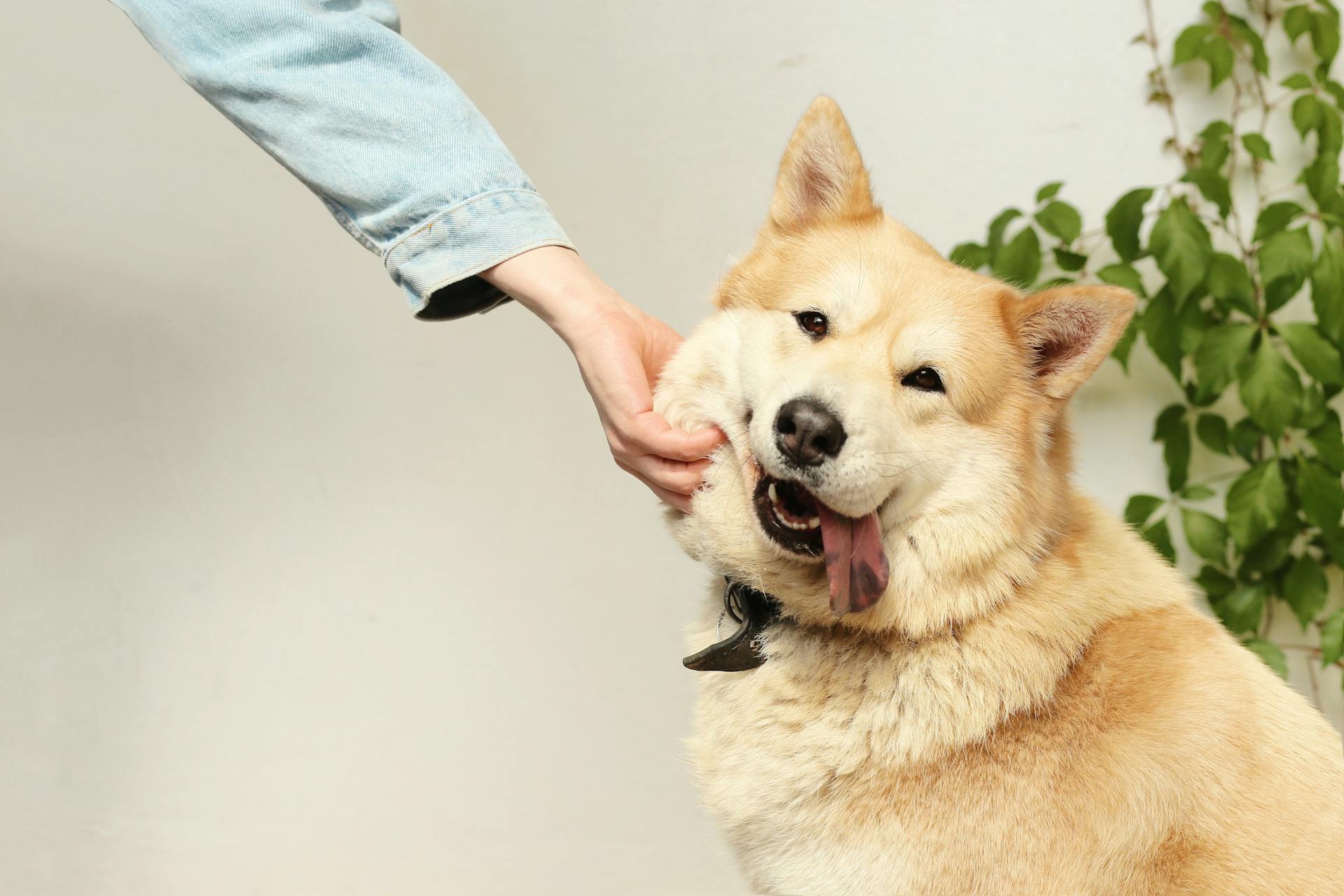
As a Bernedoodle owner, you're probably eager to ensure your furry friend lives their best life. One of the most important things to consider is their health.
Bernedoodles can inherit health issues from both parent breeds, such as hip dysplasia and eye problems. Regular veterinary check-ups are essential to catch any potential issues early on.
Related reading: Mini Bernedoodle Health Issues
Personality and Temperament
Bernedoodles are loving and kind, making them a perfect addition to nearly any family.
They love spending time around children and are gentle with smaller pets like cats. However, they do require lots of exercise and outlets for their energy, so sixty minutes of running, walking, fetching, and playing each day is a must.
As both Poodles and Bernese Mountain Dogs were bred to work, Bernedoodles can become bored easily with the same repetitive activities, so brain games designed for dogs are a great way to keep them engaged. In fact, they thrive on mental stimulation!
A fresh viewpoint: Mini Bernedoodle Dogs
Bernedoodles are intelligent and can be strong-willed, stubborn, and difficult to train, especially if left alone for extended periods. They also tend to be wary of strangers and slow to warm up to new people.
However, with positive training sessions introduced in early puppyhood, many of these possible issues can be addressed before they grow into bigger problems. In fact, your Bernedoodle may turn out to be the best dog you have ever had!
Care and Feeding
Bernedoodles come in three sizes: Standard, Miniature, and Toy. Each size has its own care requirements and ideal lifestyle needs.
A Standard Bernedoodle can weigh up to 100 pounds and stand 29 inches tall, while a Toy Bernedoodle weighs less than 20 pounds and stands 12-17 inches tall. These differences affect the amount of space each dog needs - a Standard Bernedoodle might prefer more room to stretch out.
To feed your Bernedoodle, puppies should eat three to four meals a day on a regular schedule. As they grow into adults, feeding them two meals per day is recommended. If your adult Bernedoodle eats their food too fast, try introducing a slow feeder to help them digest the meal properly.
Consider reading: Toy Petite Bernedoodle
Here are some general guidelines for each size of Bernedoodle:
- Standard Bernedoodles: Weigh 61–100 pounds, stand up to 29 inches tall, and can live 12–15 years.
- Mini Bernedoodles: Weigh 20–45 pounds, stand up to 22 inches tall, and live 14–16 years.
- Toy Bernedoodles: Weigh less than 20 pounds and stand 12–17 inches tall. These dogs live the longest, up to 18 years.
Bernedoodle adults can technically get only one meal per day, but this can lead to anxiety and hyper fixation on food. A more frequent feeding schedule is recommended for better mental health and metabolism.
In This Article
Bernedoodles are a unique breed, and understanding their needs is key to giving them the best care possible.
A Bernedoodle's personality can be quite fun-loving and outgoing, making them seem like another human member of your family. They thrive on interaction and attention from their owners.
To give your Bernedoodle the exercise they need, you'll want to provide regular physical activity, such as walks or playtime in a securely fenced area.
Their low-shedding, low-allergen coat is one of the reasons Bernedoodles have gained popularity, but it's essential to remember that this doesn't mean they're completely hypoallergenic.
The generation label assigned to your Bernedoodle - F1, F1b, F2, or F3 - can give you insight into their lineage and potential characteristics.
On a similar theme: Bernedoodles and Goldendoodles
Doodles with Kids
Bernedoodles are a great choice for families with kids because they're friendly and affectionate dogs that love being around people.
In fact, Bernedoodles are often described as "family dogs" because of their ability to get along well with children and other pets in the household. This makes them an excellent option for households with multiple furry friends.
One thing to keep in mind is that Bernedoodles do need regular grooming to prevent matting and tangling of their fur, which can be a bit of a challenge for busy families.
Here are some key benefits of having a Bernedoodle as a family pet:
- They're friendly and affectionate dogs that love being around people.
- They get along well with children and other pets in the household.
- They're relatively easy to train, making them a great choice for first-time dog owners.
Just remember, Bernedoodles do need some exercise and playtime to keep them happy and healthy, so make sure you have enough space and time to devote to your furry friend.
Bernese Mountain Poodle Care
Bernese Mountain Poodle Care is a top priority for these lovable dogs. They require regular grooming to keep their coats tangle-free and healthy.
A Bernedoodle's coat needs consistent brushing, ideally every week, to prevent matting and tangling. Regular grooming appointments can also help keep their hair under control.
Each Bernedoodle size has its own unique care requirements, so it's essential to consider the specific needs of your dog based on its size. Here are some general guidelines for each size:
Standard Bernedoodles, in particular, need plenty of space to stretch their legs and sleep comfortably. While they can adapt to smaller living spaces with proper exercise, it's crucial to provide them with enough room to move around.
Remember that all Bernedoodle sizes are adaptable, so a well-exercised dog can thrive in most families. However, understanding the specific needs of your dog based on its size will ensure you're providing the best possible care for your furry friend.
Curious to learn more? Check out: Bernedoodle vs Bernese Mountain Dog
Feeding Guidelines
Feeding your Bernedoodle requires some planning and attention to their individual needs.
Bernedoodle puppies should eat three to four meals a day on a regular schedule, with puppy food formulated for large breeds suitable for Standard Bernedoodles.

You'll want to space out these meals evenly throughout the day to prevent overeating and anxiety in your pup. A meal every 12 hours is better for their mental health and metabolism.
As your Bernedoodle grows into adulthood, you can switch to two meals per day. However, if they're eating too fast, consider using a slow feeder to help them savor each bite.
The amount of food your Bernedoodle needs depends on their size, health, and lifestyle. Toy Bernedoodles eat significantly less than larger ones, so be sure to adjust their portions accordingly.
It's essential to discuss a feeding plan with your veterinarian, as there is no one-size-fits-all approach to feeding a Bernedoodle. They can help you determine the best diet for your dog based on their unique needs and health status.
Additional reading: Bernedoodle Health Issues
Do Doodles Shed?
Bernedoodles are known for their low-shedding coat, making them a great choice for people with allergies.
Their coat is inherited from a mix of the Bernese mountain dog and the standard poodle, resulting in a short and curly or wavy texture that sheds very little.
The curlier the bernedoodle's coat is, the more hypoallergenic they are, but it's essential to note that there's actually no such thing as a "hypoallergenic" dog.
Regular brushing every week can help keep their hair tangle-free and stop it from growing unruly.
For your interest: Bernedoodle Hunting Dog
Health and Wellness

Bernedoodles can inherit conditions from their parent breeds, so it's essential to check with your breeder for a complete health history.
The Bernedoodle lifespan ranges 12–18 years, depending on how big your dog is, with smaller dogs living longer than larger ones.
Unfortunately, Bernedoodles have a higher risk of developing cancer, especially Standard Bernedoodles, which can be inherited from their Bernese Mountain Dog parent.
Curious to learn more? Check out: Best Dog Food for Bernedoodle Puppies
Health Concerns
Bernedoodles can inherit conditions from their parent breeds, so it's essential to check with your breeder for a complete health history.
The risk of hip and elbow dysplasia is higher in large Bernedoodle breeds, which can be exacerbated by over-exercising them during puppyhood. This condition causes pain and lameness due to abnormal joint development.
Smaller Bernedoodles tend to live longer than their larger counterparts, with a lifespan ranging from 12-18 years. Thankfully, some health issues can be corrected with medication or surgery if necessary.
Getting your Bernedoodle from a reputable breeder is crucial in preventing many health issues, as they should have screening tests available and provide a family history.
Life Expectancy

The life expectancy of a Bernedoodle is a great topic to explore. The bernedoodle breed is known to live between 12 and 18 years.
As you consider bringing home a new furry friend, it's essential to understand that smaller sizes of this dog generally have longer lifespans than the standard size. Most larger dogs follow this same trend.
A well-cared-for Bernedoodle can live up to 18 years, which is a significant commitment for any pet owner. This means you'll have plenty of time to shower your new companion with love and attention.
With proper care and attention, many Bernedoodles are able to reach their full lifespan potential.
Here's an interesting read: Bernedoodle Breeders in New York
Training Your
Training your Bernedoodle requires patience and time.
Poodles are quite easy to train because they are so intelligent, but Bernese Mountain Dogs have a stubborn streak that might carry over to your Bernedoodle.
Early socialization is key, exposing your doodle pup to various places and people will help ensure he's happy, friendly, and confident.
Positive reinforcement training sessions should start from a young age, using verbal and physical praise to reward good behavior, and redirection instead of punishment for wrong actions.
Bernedoodles are quick learners, picking up basic cues, fun tricks, and essentials like crate and potty training with ease.
Leash training should begin immediately, as Bernedoodles love going on walks.
You might enjoy: Bernedoodle Potty Training
Coat Management
Bernedoodles are known for their low-shedding coats, but they can be prone to developing tangled mats if not brushed regularly.
You should brush your Bernedoodle at least twice a week to prevent matting and keep their coat looking its best. This will also help to distribute skin oils and promote healthy coat growth.
Regular grooming sessions with a professional are also recommended to keep your Bernedoodle's coat in top condition. Don't forget daily teeth brushings with doggy toothpaste to deter plaque buildup and maintain good oral health.
Brushing your Bernedoodle every week is a must, as their coat can quickly become unruly if not properly maintained. Setting up regular grooming appointments will also help to keep their hair tangle-free.
See what others are reading: Bernedoodle Coat Types
Size and Characteristics
The size and characteristics of a Bernedoodle are quite varied.
A tiny Bernedoodle will stand between 10 and 17 inches tall, making them a perfect lap dog. They weigh between 10 and 24 pounds, which is relatively small compared to other breeds.
Miniature Bernedoodles are slightly larger, standing between 18 and 22 inches tall and weighing between 25 and 49 pounds. This size is still quite manageable for many families.
The standard-sized Bernedoodle is generally the most popular, standing between 23 and 29 inches tall and weighing between 50 and 90 pounds.
Frequently Asked Questions
Why are Bernedoodles so expensive?
Bernedoodles are expensive due to the time and effort invested in early socialization and environmental enrichment by reputable breeders. This investment contributes to their well-rounded temperament and adaptability, making them a valuable companion.
What are the disadvantages of Bernedoodles?
Bernedoodles may be prone to health issues like hip dysplasia, elbow dysplasia, and eye problems. Regular veterinary care and exercise are essential for their overall well-being
How much money is a Bernedoodle?
A Bernedoodle typically costs between $1,500 and $5,000. Adopting from shelters or rescue organizations is often a more affordable option, with prices ranging from $50 to $300.
Do Bernedoodles bark a lot?
Bernedoodles are known to be quiet dogs, barking infrequently. They may not be the best choice for guarding a house due to their friendly nature.
Is a Bernedoodle a good dog?
Yes, Bernedoodles are highly affectionate dogs that thrive on human interaction and make excellent family pets. They're also naturally talented therapy dogs due to their loving nature.
Sources
- https://petventuresbook.com/blogs/blog/bernedoodle-breed-guide-key-facts-about-the-bernese-mountain-dog-poodle-mix
- https://www.bernerbabies.com/bernerdoodleinfo
- https://www.petmd.com/dog/breeds/bernedoodle
- https://www.embracepetinsurance.com/dog-breeds/bernedoodle-breed-information-characteristics
- https://dogacademy.org/breeds/bernedoodle
Featured Images: pexels.com


